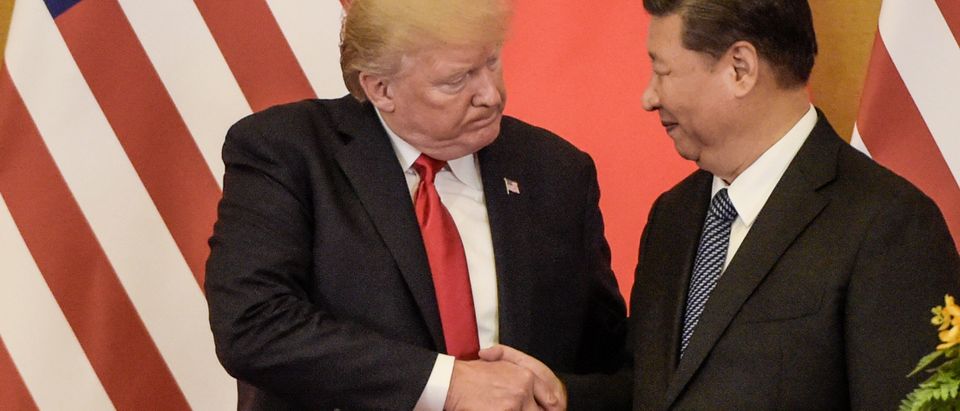Ultimately, President Trump did what he said he wouldn’t do: cut an unenforceable, partial trade deal with China that will change little about the way Beijing does business. The move isn’t calamitous, but does call into question America’s future handling of the China threat in a likely second Trump term.
Senate Democratic Minority Leader Chuck Schumer said of Trump’s deal, “He has sold out for a temporary and unreliable promise from China to purchase some soybeans.” For once, Schumer got it just about right.
The only discernible achievement in an agreement Trump deemed “an amazing deal for all” is that China has said it will purchase perhaps $40 billion or more in U.S. agricultural products. But it has so far refused to put that figure on paper, which isn’t a good sign given Beijing’s long history of cheating on all major international agreements.
There are already media reports that Beijing will account for $10 billion of trade deficit reduction by reclassifying U.S. exports to Hong Kong to mainland China instead. This move, which a shipping expert described to me as “flipping the bill of lading,” is legerdemain that won’t reflect any actual increase in U.S. exports.
Furthermore, Beijing’s promised activities won’t come close to making up for the $419 billion annual goods deficit we have with China, and many of the food-related purchases would have occurred anyway. China is in the middle of a food crisis sparked by swine flu. Prices for pork, the most important protein in China, have doubled. Fruit prices have also skyrocketed. China needs to turn abroad for pork, soy, and other food, but this temporary development hardly reflects fundamental change.
In addition, the fact remains that commodities and cattle prices are above historical averages, and there is no crisis in U.S. agriculture that warrants a panic deal with China. Two more important trade deals Trump negotiated, the U.S.-Japan deal and the U.S.-Mexico-Canada agreement to replace NAFTA, will be major boons to American farmers and ranchers when they take effect in 2020.
Apart from agriculture, U.S. Trade Representative Bob Lighthizer, who negotiated the China deal, claimed in a statement that that Beijing agreed to a “strong” dispute-resolution mechanism and it will desist from intellectual-property theft and currency manipulation. However, he offers no details on either, likely because no such details exist.
The politics are even worse than the economics. In agreeing to the deal, Trump has pleased constituencies on Wall Street and in Silicon Valley that will continue to oppose him energetically, no matter how often Apple CEO Tim Cook is feted at the White House. Trump may pick up some incremental votes in the farm states that he was going to win easily anyway. But less enthralled will be the companies and factory workers in Rust Belt states who will continue to suffer from unfair Chinese trade practices.
Furthermore, it is now possible for Trump’s Democratic challengers to get to the right of him on China by sounding more hawkish. Trump has been far tougher on China than any of his predecessors and historians will eventually attribute much of the historic awakening of the free world to the China threat to Trump. But that history won’t stop Democrats and their media friends from saying he caved to Beijing because he needed a good news story during impeachment.
Moreover, the rest of China policy is adrift. While Trump has spoken about rebuilding the military and indeed worked with congressional Republicans who successfully restored a $700 billion defense budget, he has little to show for this in the Pacific. Both qualitatively and quantitatively, there are no more U.S. naval, aviation, army, or nuclear capabilities in the Pacific today than there were when President Obama left office. Trump could have moved forces from Afghanistan and NATO to Asia, but that would have required the translation of presidential sentiments and musings into clear policy, communications, and then real-world implementation activities — the ordinary functioning of government that is far from ordinary in this administration.
Augmenting such hard power options with a coherent political warfare regimen like the one the free world successfully deployed against the Soviet Union seems more impossible still. Vice President Mike Pence and Secretary of State Mike Pompeo have spoken eloquently in support of those struggling against Chinese government tyranny in Hong Kong and western China. No one expects Trump to develop a bleeding heart for freedom movements. But one hopes in vain that statements from officials would give way to coherent action; that the administration will decide formally to support these movements and spotlight symbols of freedom like Taiwan as alternatives to Chinese tyranny, not just because it is the right thing to do, but because causing political trouble for our chief adversary in the world is good for our own national security.
Trump says that negotiations on a “Phase 2” trade deal with China right away — a tacit nod to Phase 1’s inadequacies. Fat chance. Beijing won’t resume serious talks voluntarily, and will threaten to stop any of the purchases or other reforms it promised in Phase 1 if Washington persists or threatens new tariffs. Trump will then be faced with another choice in how to deal with a duplicitous, communist enemy.
Christian Whiton (@ChristianWhiton) was a State Department senior adviser in the Donald J. Trump and George W. Bush administrations. He is a senior fellow at the Center for the National Interest and is the author of “Smart Power: Between Diplomacy and War.”
The views and opinions expressed in this commentary are those of the author and do not reflect the official position of The Daily Caller.


